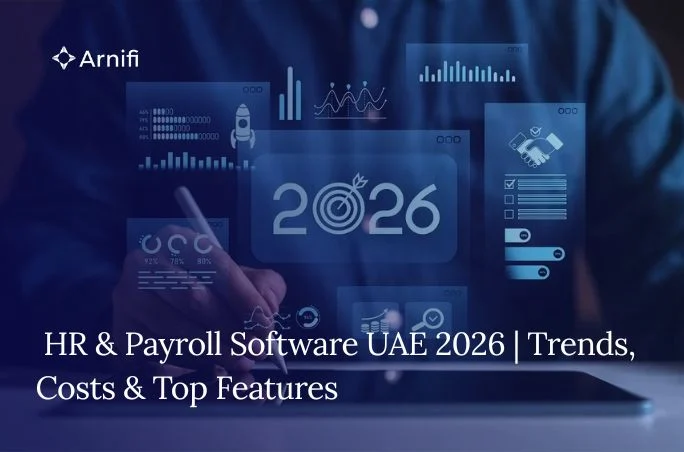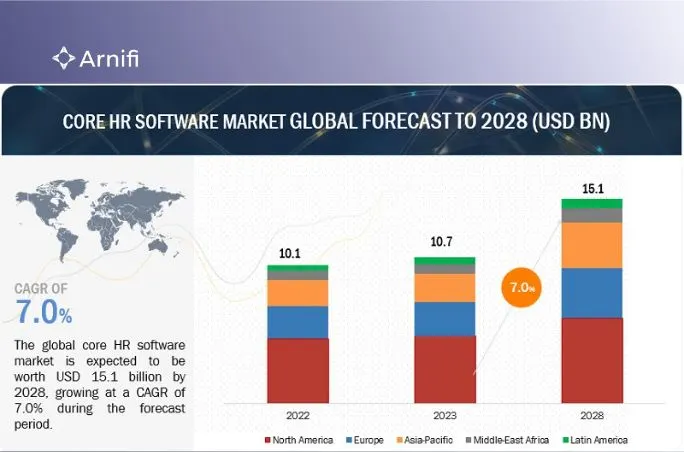HR and Payroll Software UAE | What’s Changing in 2026?
by Ishika Bhandari Nov 25, 2025  7 MIN READ
7 MIN READ

Table of contents
- Why HR and Payroll Software Matter More in 2026
- The Big Shift: From Basic HR Systems to Unified HR-Payroll Platforms
- Features UAE Businesses Now Consider Non-Negotiable
- Top HR and Payroll Software Trends in 2026
- Popular HR and Payroll Software Used in the UAE
- How to Choose the Right HR and Payroll Software in the UAE
- Cost Guide: HR and Payroll Software in the UAE
- Choosing HR and Payroll Software with Arnifi HR
- FAQs
- Conclusion
The human resources in the UAE are moving into the new digital transformations. HR and payroll software solutions are no longer merely a tool for record keeping in the UAE; they’re a core engine in compliance, automation, workforce planning, and employee experience. As we approach our vantage point in 2026, we see a rapid acceleration into unified HR-payroll ecosystems as the shift away from old-school HRIS/HRMS systems has begun.
We see shifting onto platforms that automate payroll while avoiding WPS errors and facilitate onboarding for hybrid and distributed teams. Whether looking for an assessment on HR and Payroll Software in the UAE, seeking comparisons between Bayzat Payroll, Zoho Payroll UAE, or greytHR UAE, or searching around cloud HR software UAE, the landscape is changing, and expectations are higher than ever.
Why HR and Payroll Software Matter More in 2026
UAE companies are having to contend with new operational realities, while manual HR processes are incapable of keeping pace. Several local triggers are shaping why the demand for HR software, payroll software, and AI-driven solutions is rising:
New hiring patterns
The modern requirements of hybrid teams, freelancers for projects, and remote employees in countries such as India and the Philippines have become a quintessential reality. Multi-country payroll capabilities, cross-border compliance, and flexibility in contracts are some of the requirements that an HR team needs to have in systems.
Faster visa cycles and documentation management
The UAE’s digital-first visa processes demand real-time tracking of Emirates ID, passport, and residency documentation. Missing an expiry date is no longer an option.
Stricter payroll accuracy due to WPS
Wage Protection System (WPS) is a significant compliance requirement. Even the slightest error in file format or payment cycle can mean fines or blocked operations. Thus, businesses are adopting WPS payroll software and payroll automation in the UAE.
Pressure to streamline HR headcount
As there is a driving adoption for smaller HR teams in favour of generous compliance, many SMEs and mid-market companies are driving the adoption of HR automation in the UAE and automated payroll in the UAE.
Employees want mobile-first access
From payslips to leave requests, teams expect HRMS software UAE platforms that work like consumer apps. Employee self-service is no longer optional.

The Big Shift: From Basic HR Systems to Unified HR-Payroll Platforms
Traditional HRIS systems worked well when operations were simple. But today, businesses want a single system that manages people data, payroll, compliance, attendance, and workflows end-to-end.
Companies in 2026 are ditching split or outdated systems for the following reasons:
- Manual reconciliation is so tedious
- It creates data silos in various systems
- Increased WPS error rates are seen without integration
- Attendance and shifts being unsynchronized delays payroll
- Compliance gaps emerge due to duplicate employee files
Thus, HR payroll system UAE platforms, which unify everything- HR, payroll, attendance, documents, and compliance- are considered increasingly standard.
Features UAE Businesses Now Consider Non-Negotiable
By 2026, with the most requested features being influenced by local compliance, hybrid workforce needs, and time-saving automation, the essentials should include:
Automated payroll linked to attendance
The systems work on calculating overtime, penalties, and shifts using AI-driven timesheets and forecasting
WPS file generation and error checks
In short, the system checks for WPS formats, salary cycles, exchange house codes, and employee data that can be sent for submission
Visa, passport, and EID expiry alerts
No manual reminders, only automated compliance
Cross-border payroll
Many companies nowadays run UAE + India + GCC payroll in one dashboard
Employee self-service (mobile-first)
On a mobile app, employees handle leave, attendance, benefits, and document submission
Digital document vault
HR teams can store contracts, onboarding files, and compliance documents for audit purposes
Integrations with biometrics, POS, and ERP
This is vital for shift-heavy companies in retail, food and beverage, logistics, and contracting
Consequently, companies are increasingly searching for consolidated platforms such as Bayzat, Zoho People + Zoho Payroll, Odoo HR, Keka, greytHR, and ZenHR
Top HR and Payroll Software Trends in 2026
Rather than reviewing software, we will instead examine the breakthrough trends that are re-shaping the HR world in the United Arab Emirates:
Trend 1: AI-powered payroll accuracy
AI is capable of flagging errors right before a payroll run, missed attendance, wrong overtime, duplicate entries, or WPS inconsistencies.
Trend 2: HR automation for small teams
From hire to layoff, SMEs are taking away manual HR roles, replacing them with workflow automation.
Trend 3: Unified platforms as a “single source of truth”
HR, payroll, compliance, attendance, and documents now have a common ecosystem.
Trend 4: Mobile-first HR experience
Employees want apps, not portals, and mobile is becoming the default for HR.
Trend 5: Automated compliance reminders
The system automatically notifies HR regarding changes in requirements for:
- visa renewals
- expiries of residency and passports
- new WPS regulations
- AML or labour law updates
Trend 6: Real-time attendance & geo-tracking
Biometric, QR, and geo-attendance are the norms for field, retail, and blue-collar teams.
Trend 7: Multi-country payroll consolidation
Organizations with remote workers in India, Pakistan, or the Philippines want one payroll for all regions.
Popular HR and Payroll Software Used in the UAE
The most widely utilized platforms, together with their strong points, are:
- Bayzat – strong for employee benefits + insurance
- Zoho People + Zoho Payroll UAE – affordable and great for SMEs
- Keka – robust attendance + performance management
- Odoo HR + Payroll – flexible ERP-level customisation
- greytHR UAE – strong WPS and payroll accuracy
- ZenHR – GCC-focused compliance
These platforms commonly feature in HRIS vs HRMS, HRMS vs HCM, and other general evaluations comparing types of HR systems.
How to Choose the Right HR and Payroll Software in the UAE
A practical, business-oriented selection approach:
- Fast-growing teams should select those systems that allow auto-scaling of employee tiers
- Blue-collar or shift-heavy companies should work around biometric attendance + shift rostering
- SMEs with small HR teams should select workflow automation and templates built in
- Compliance-intensive industries must obtain precise audit logs + document controls
- A hybrid workforce should rest on mobile-first cloud platforms
- Multi-country teams should bring in cross-border payroll capability
Cost Guide: HR and Payroll Software in the UAE
No standardized prices exist for price ranges that are usually given:
- Small teams (10–30 employees): AED 6–12 per employee/month
- Mid-sized teams (50–200 employees): AED 8–20 per employee/month
- Large companies: custom pricing based on features
Costs depend on:
- employee count
- integrations (biometric, ERP, POS)
- onboarding support
- custom workflows
- payroll complexity
- additional modules (performance, recruitment, assets, etc.)
If options are being considered, searches like payroll system cost UAE, hr software for small business UAE, and cloud hr software UAE are becoming popular.
Choosing HR and Payroll Software with Arnifi HR
Arnifi HR helps companies to choose and implement the right software in:
- Completing needs assessment
- Comparing and evaluating vendors
- End-to-end implementation
- Training employees
- Aligning with HR policies
- Providing ongoing support and optimization
FAQs
1. What is the best HR and payroll software in the UAE?
It depends on your company’s size and needs. Bayzat, Zoho, Odoo, and greytHR are widely used.
2. How much does HR and payroll software cost in the UAE?
Between AED 6–20 per employee/month, depending on features and complexity.
3. Is WPS included in payroll software?
Yes, most modern platforms include WPS generation and automated error checking.
4. Can payroll software integrate with biometrics?
Absolutely. Most systems sync biometric devices with attendance and payroll.
5. Is HRIS the same as payroll?
No, HRIS manages employee data and HR workflows, while payroll focuses on salary processing. Unified systems combine both.
Conclusion
As companies in the UAE begin to prepare for 2026, they are progressively departing from manual processes for HR and payroll and moving toward smart automated platforms powered with compliance checks. Whether you will be migrating from an existing, older HRIS wherein your HR and payroll functions for the UAE may entail WPS, multiple country payroll, and mobile self-service, the future is all about unity, AI, and integration. Connect with Arnifi now and discover the best-fit HR and payroll solution for your business.
Top UAE Packages

Related Articles
Top UAE Packages



